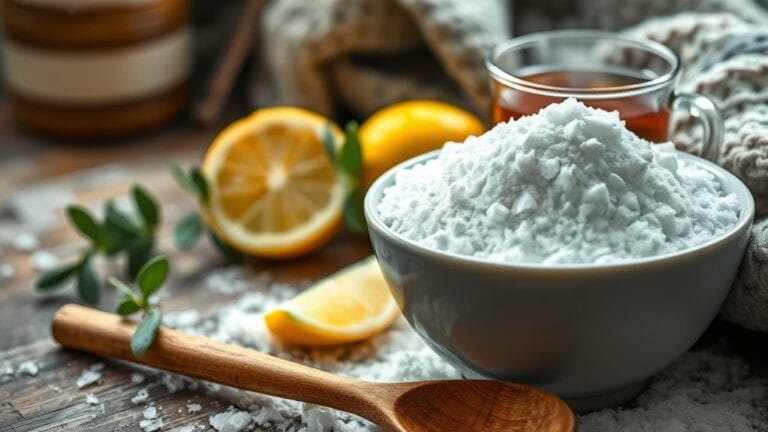Waking up with swollen hands can be frustrating and uncomfortable. Many people notice puffiness or stiffness in their fingers upon rising, leaving them marveling at the reason behind it. While occasional swelling might stem from something simple like sleeping in an awkward position, persistent puffiness could signal deeper issues like fluid retention or arthritis. Comprehending the causes—and being aware of when to take action—can make mornings feel easier. So, what really elicits this morning annoyance, and how can it be managed?
Hand Swelling and Its Impact
Waking up with swollen hands can be frustrating and uncomfortable, leaving many pondering what’s causing the puffiness. Hand swelling often stems from fluid retention or poor circulation during sleep, especially whether hands remain in one position for too long.
Hand immobilization, like resting them under a pillow or in a tight fist, can restrict blood flow, leading to morning stiffness and puffiness. Sleep hygiene plays a role too—poor posture or an unsupportive mattress may strain wrists and fingers.
While occasional swelling is normal, persistent puffiness could signal deeper issues. Staying hydrated, stretching before bed, and adjusting sleep positions can help. Elevating hands slightly or wearing loose-fitting clothing might also reduce pressure and improve circulation overnight.
Common Causes of Morning Hand Swelling
Morning hand swelling can happen for many reasons, from simple habits to fundamental health conditions. Poor hand positions during sleep, like curling fingers tightly or resting hands under the head, could restrict blood flow, leading to puffiness upon waking.
Fluid retention, often linked to high salt intake or hormonal changes, can also cause swelling. Arthritis or carpal tunnel syndrome might trigger inflammation, making joints stiff and tender. Even minor injuries or repetitive motions from daily tasks can contribute.
Simple fixes like hand stretching routines before bed or adjusting sleeping posture may help. Dehydration or prolonged inactivity overnight could slow circulation, worsening swelling. If swelling persists or includes pain, consulting a doctor can ensure no underlying issues are missed.
How Sleep Position Affects Hand Swelling
Since hands often bear the brunt of nighttime pressure, the way someone sleeps can play a big role in morning swelling. Hand positioning during sleep matters—curling fingers tightly or tucking hands under the body restricts blood flow, leading to puffiness. Side sleepers could notice more swelling if their arms are pinned beneath them, while stomach sleepers risk compressing wrists. Mattress firmness impact also plays a part; too-soft surfaces let joints sink, straining circulation, while overly firm ones create pressure points.
| Sleep Position | Effect on Hands |
|---|---|
| Side Sleeping | Might pinch nerves or reduce flow |
| Stomach Sleeping | Wrists bend unnaturally |
| Back Sleeping | Hands rest better if elevated |
| Fetal Position | Fingers curl, reducing circulation |
Adjusting posture or using a supportive pillow can help.
Dietary Factors
High sodium intake can cause the body to retain excess fluid, leading to swollen hands in the morning.
Dehydration could also trigger swelling as the body holds onto water whenever it senses a shortage. Adjusting these dietary factors often helps reduce hand puffiness.
High Sodium Intake
Excess salt in the diet can lead to fluid retention, which often shows up as puffiness in the hands, especially upon waking. High salt intake causes the body to hold onto extra water to balance sodium levels, resulting in swelling. Excessive salt consumption is common in processed foods, restaurant meals, and salty snacks, making it easy to overdo without realizing.
Processed foods like chips, canned soups, and deli meats are packed with concealed sodium.
Eating out frequently increases the likelihood of consuming more salt than needed.
Salty cravings can trick the body into retaining fluids overnight, leading to morning swelling.
Reading labels helps identify high-sodium products and choose lower-salt alternatives.
Reducing sodium intake often eases hand swelling, but balance is key—too little salt can also cause issues. Drinking water helps flush excess sodium, but dehydration worsens retention.
Dehydration Effects
As the body fails to obtain sufficient water, it clings to every drop it can, sometimes leaving hands puffy and stiff in the morning. Dehydration tricks the body into holding onto fluids, causing fluid retention that shows up as swelling. An electrolyte imbalance—often from losing too much sodium and potassium—can make it worse.
Without enough water, blood flow slows, and tissues retain extra fluid, especially overnight. Signs include tight rings, stiff fingers, or difficulty making a fist. Drinking enough water throughout the day helps, but sipping too much at once might backfire. Eating water-rich foods like cucumbers or watermelon supports hydration. Avoiding excessive caffeine or alcohol prevents further fluid loss. Balancing electrolytes with snacks like bananas or nuts can also ease morning puffiness.
Health Conditions Linked to Hand Swelling
Swollen hands in the morning might indicate inherent health conditions like arthritis, which causes joint inflammation.
Kidney disease can lead to fluid retention, while heart or circulation problems can reduce proper blood flow. Recognizing these conditions early helps manage symptoms effectively.
Arthritis and Joint Inflammation
Morning hand swelling can sometimes point to arthritis or joint inflammation, conditions that cause stiffness and discomfort. These issues often stem from immune system dysfunction, where the body mistakenly attacks healthy joint tissues, triggering an inflammatory response. Whenever inflammation isn’t properly regulated, fluid builds up, leading to swollen, tender hands—especially after periods of inactivity like sleep.
- Rheumatoid arthritis: An autoimmune disorder causing chronic joint inflammation.
- Osteoarthritis: Wear-and-tear damage that worsens with age.
- Psoriatic arthritis: Linked to skin conditions, affecting joints and tendons.
- Gout: Uric acid crystals inflaming joints, often starting in the fingers.
Stiffness, redness, and warmth around joints are common signs. Early diagnosis and treatment can slow progression and improve comfort. Gentle stretches, anti-inflammatory diets, and prescribed medications often help manage symptoms.
Kidney Disease Complications
Why do hands sometimes puff up due to kidney problems? Whenever kidneys struggle to filter waste and excess fluid, swelling can occur, especially in the hands and feet.
Chronic kidney failure reduces the body’s ability to balance fluids, leading to buildup in tissues. In end stage renal disease, severe kidney damage worsens this effect, often causing noticeable puffiness upon waking.
Other signs include fatigue, changes in urination, and high blood pressure. Managing sodium intake helps reduce fluid retention, while prescribed medications can support kidney function. Staying hydrated—but not overhydrated—is key.
Regular check-ups monitor kidney health, and early intervention slows progression. Those with persistent swelling should consult a doctor to rule out contributory conditions. Proper care eases discomfort and supports overall well-being.
Heart or Circulation Issues
As the heart struggles to pump efficiently or circulation slows, fluid can pool in the hands, leading to noticeable puffiness—especially after remaining motionless for hours. Cardiac dysfunction, such as heart failure, often disrupts the body’s ability to manage fluid buildup, causing swelling in the extremities. Poor circulation from conditions like peripheral artery disease can also contribute to morning hand swelling.
- Heart failure: Weak pumping action allows fluid to accumulate in tissues.
- Peripheral artery disease: Narrowed arteries reduce blood flow, trapping fluid in the hands.
- Deep vein thrombosis: Blood clots impair circulation, leading to localized swelling.
- Lymphedema: Damaged lymph vessels fail to drain excess fluid effectively.
Monitoring other symptoms—like shortness of breath or fatigue—can help identify heart-related causes. Elevating hands while sleeping or wearing compression gloves may ease discomfort, but addressing the fundamental condition is essential.
Simple Home Remedies to Reduce Swelling
As hands feel puffy and stiff upon arising, simple home remedies can often bring relief without a trip to the doctor. Elevation techniques, such as raising the hands above heart level for 10–15 minutes, help drain excess fluid. Compression therapies, like wearing snug gloves or wraps, can reduce swelling by encouraging circulation.
Soaking hands in cool water with Epsom salts eases discomfort while reducing inflammation. Gentle finger stretches or massages improve mobility and stimulate fluid movement. Staying hydrated and reducing sodium intake prevents fluid retention. Applying cold packs for short intervals numbs soreness and minimizes puffiness. Avoiding tight jewelry or restrictive clothing prevents added pressure. These methods offer quick, accessible solutions for morning hand swelling, allowing for easier movement throughout the day.
When to Seek Medical Attention for Swollen Hands
While home remedies often help with morning hand swelling, persistent or severe puffiness could indicate a deeper issue. See a doctor if swelling is severe, lasts more than a few days, or comes with other troubling signs. Ignoring these signals might delay treatment for foundational conditions.
- Severe or worsening swelling: If hands remain swollen despite rest or elevation, medical assessment is needed.
- Pain or redness: Swelling paired with discomfort, warmth, or discoloration could signal infection or inflammation.
- Other symptoms: Fever, joint stiffness, or numbness alongside swelling may point to systemic issues.
- Sudden onset: Rapid, unexplained swelling warrants prompt attention to rule out serious causes like blood clots.
Early intervention helps prevent complications, so don’t hesitate to seek care when symptoms feel irregular.
Preventative Measures to Avoid Morning Swelling
Many people wake up with puffy hands, but simple lifestyle adjustments can reduce or prevent this discomfort. Elevating hands overnight on a pillow helps fluid drain, reducing swelling. Wearing compression gloves supports circulation and minimizes fluid buildup.
Avoiding salty foods before bed prevents water retention, while staying hydrated flushes excess sodium. Limiting alcohol and caffeine in the evening also helps, as they can dehydrate the body. Gentle movements before sleeping, like flexing fingers, encourage blood flow. Keeping the bedroom cool prevents overheating, which can worsen swelling. Loose-fitting sleepwear avoids restricting circulation.
These small changes, combined with consistency, can make mornings more comfortable. For those with persistent swelling, tracking habits helps identify triggers. Prevention focuses on balancing fluid levels and supporting healthy circulation overnight.
Exercises and Stretches to Improve Hand Circulation
Waking up with stiff, swollen hands can make simple tasks frustrating, but targeted exercises and stretches may ease discomfort by boosting circulation. Gentle movements help reduce stiffness and improve wrist joint mobility, while hand strengthening exercises promote better blood flow.
- Finger Stretch: Spread fingers wide, hold for 5 seconds, then relax. Repeat 10 times to increase flexibility.
- Wrist Circles: Rotate wrists slowly clockwise and counterclockwise to loosen tight joints.
- Grip Squeeze: Press a soft ball or towel for 5 seconds, releasing to build hand strength.
- Thumb Touches: Tap each fingertip to the thumb, improving dexterity and circulation.
Regular practice can prevent morning swelling by keeping hands active and fluid-moving. Consistency matters—just a few minutes daily makes a difference.
Conclusion
Morning hand swelling fades with awareness and action. Adjusting sleep positions eases pressure, balancing salt intake reduces fluid retention, and staying hydrated supports circulation. Gentle stretches awaken stiff joints, while monitoring health flags persistent issues. Addressing causes brings relief, protection guarantees comfort, and constancy maintains results. Hands regain their ease, mornings start lighter, and small changes yield lasting benefits.





